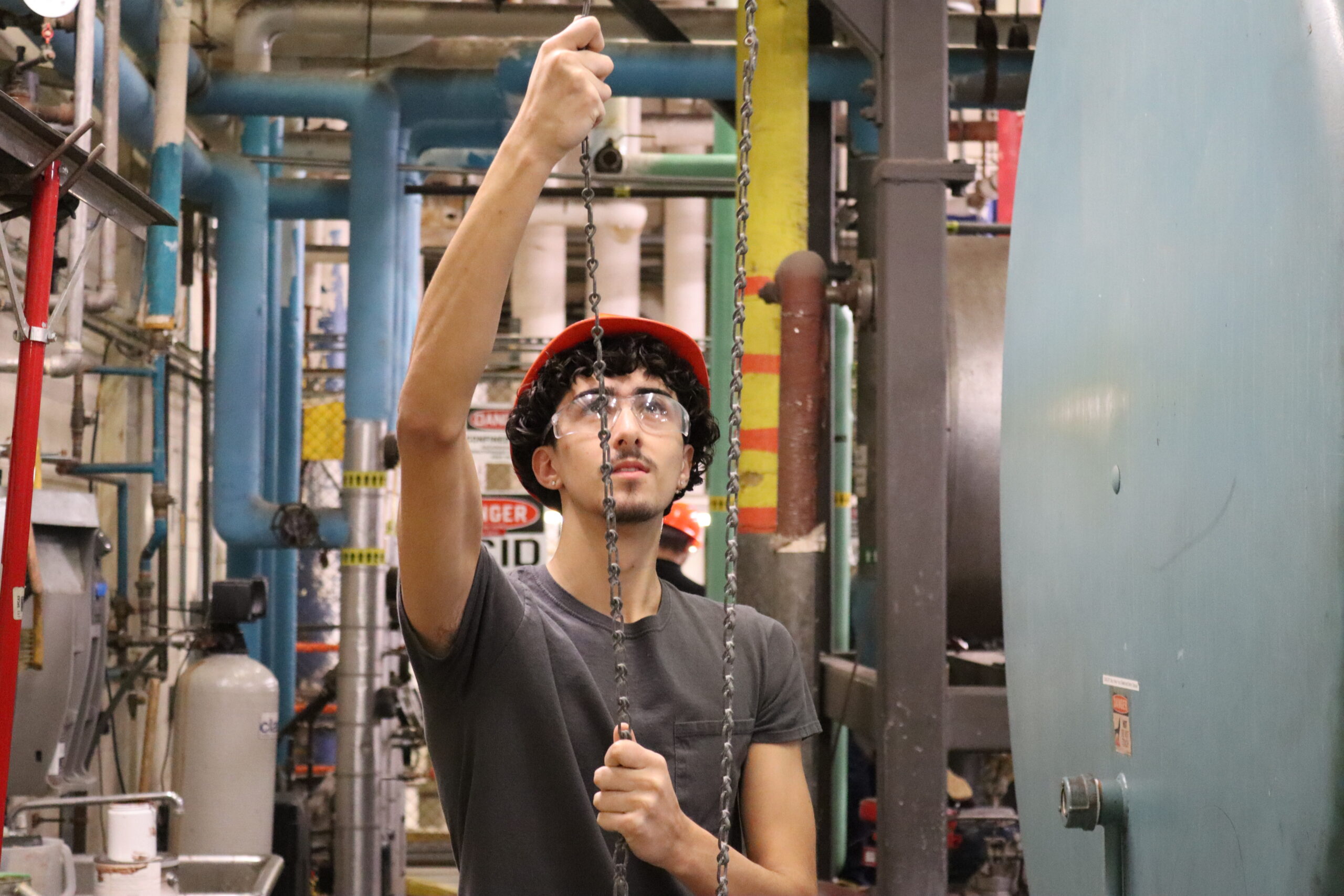CVTE
Stationary Engineering
Guy Shepherd, Academy C Administrator – Ext. 113
Course & Program of Studies
Statement of Purpose
The Stationary Engineering program offers a comprehensive curriculum that prepares students for careers in the power generation industry. This program combines theoretical knowledge with hands-on experience to equip students with the necessary skills to operate and maintain power plants efficiently and safely.
Key Areas of Focus:
- Power Plant Systems:
- Steam power plants
- Gas turbine power plants
- Combined cycle power plants
- Nuclear power plants
- Boiler Systems:
- Boiler types and operation
- Boiler water chemistry and treatment
- Boiler feedwater systems
- Boiler safety systems
- Turbine Systems:
- Steam turbine operation
- Gas turbine operation
- Turbine components and maintenance
- Electrical Systems:
- Power generation principles
- Electrical distribution systems
- Motor control centers
- Electrical safety
- Instrumentation and Control:
- Control systems and automation
- Instrumentation and sensors
- Data acquisition and analysis
- Mechanical Systems:
- Pumps and compressors
- Piping systems and valves
- Heat exchangers
- Mechanical seals and packing
Hands-on Experience:
- Pipefitting and Welding: Practical skills in pipefitting, welding, and fabrication.
- Equipment Operation and Maintenance: Hands-on experience with power plant equipment.
- Troubleshooting and Diagnostics: Identifying and resolving equipment malfunctions.
- Safety Practices: Adhering to safety standards and procedures.
Career Pathways:
- Power Plant Operator: Monitoring and controlling power plant operations.
- Maintenance Technician: Performing maintenance and repair tasks on power plant equipment.
- Instrumentation and Control Technician: Calibrating and maintaining control systems.
- Chemical Water Treatment Technician: Monitoring and treating water used in power plants.
By the end of this program, students will be well-prepared to enter the workforce as skilled stationary engineers. They will have the knowledge and skills to work in various roles within the power generation industry, contributing to the reliable and efficient operation of power plants.
Exploratory Program
This 3-day exploratory program offers a comprehensive introduction to the field of stationary engineering. By combining theoretical knowledge with hands-on experience, students gain valuable insights into the key concepts and skills required for success in this industry.
Day 1: Introduction to Stationary Engineering
- Safety Orientation: Emphasizing the importance of safety protocols and personal protective equipment (PPE).
- Overview of Stationary Engineering: Exploring the role of stationary engineers in maintaining and operating various systems, including HVAC, electrical, and mechanical systems.
- Basic Tools and Equipment: Introducing students to hand tools, power tools, and measuring instruments used in the trade.
- Fundamental Concepts: Covering basic concepts such as pressure, temperature, flow rate, and energy transfer.
Day 2: Hands-on Experience: Copper Tubing
- Safety Protocols: Reinforcing safety guidelines, particularly when working with cutting tools and open flames.
- Tool Usage: Demonstrating the proper use of cutting tools, tubing benders, and reamers.
- Cutting and Cleaning: Practicing precise cutting of copper tubing and cleaning techniques to ensure proper fitting.
- Project Initiation: Copper Letter Holder: Starting the assembly of a copper letter holder project.
Day 3: Project Completion and Evaluation
- Soldering Techniques: Learning soldering techniques to join copper pieces securely.
- Project Assembly: Completing the assembly of the copper letter holder.
- Cleaning and Finishing: Cleaning the project and applying a protective finish.
- Project Evaluation: Assessing students’ work based on accuracy, cleanliness, and adherence to safety guidelines.
By the end of this exploratory program, students will have a solid understanding of the core concepts of stationary engineering and the skills required to succeed in this field. They will also develop a strong foundation in safety practices and hands-on skills, preparing them for further education and career opportunities in the industry.
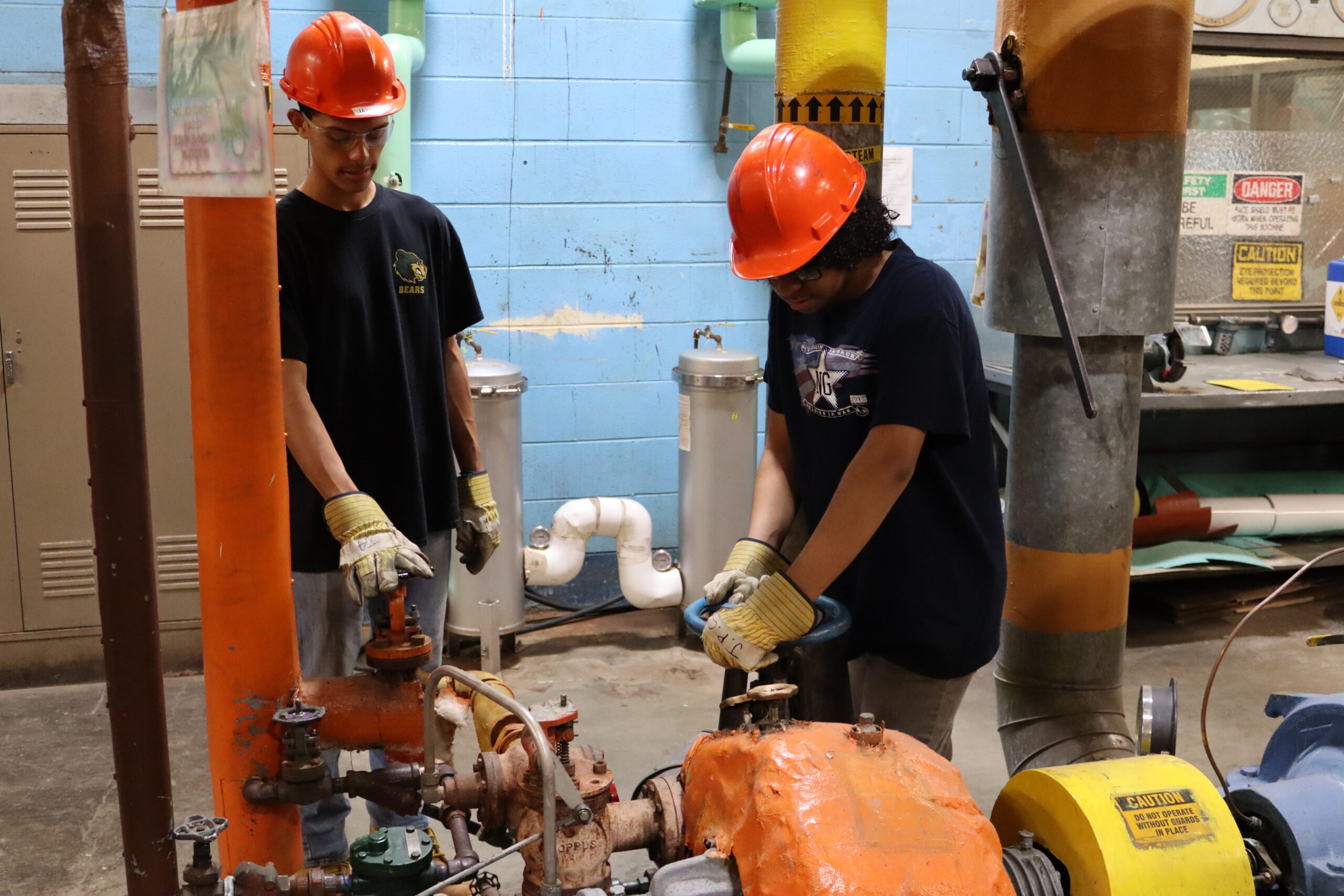
Freshman Program
This course provides students with the essential skills and knowledge required to perform maintenance and repair tasks in power plant settings. The focus is on practical, hands-on experience, combined with theoretical understanding.
Key Topics:
- Safety Procedures:
- Identifying and mitigating workplace hazards
- Proper use of personal protective equipment (PPE)
- Safe handling of tools and equipment
- Basic Tool Usage:
- Proficiency in using hand tools (wrenches, screwdrivers, pliers)
- Operation of power tools (drills, saws, grinders)
- Pipefitting:
- Cutting, threading, and joining pipes (copper, black iron, PVC)
- Valve and Fitting Identification:
- Recognizing different types of valves and fittings
- Understanding their functions and applications
- Gasket Cutting and Installation:
- Measuring and cutting gaskets to fit specific applications
- Installing gaskets to ensure proper sealing
- Leak Detection and Repair:
- Identifying and locating leaks in piping systems
- Using leak detection tools and techniques
- Repairing leaks using appropriate methods
- Mechanical Maintenance:
- Performing routine maintenance on pumps, compressors, and other mechanical equipment
- Troubleshooting and repairing mechanical breakdowns
- Electrical Maintenance:
- Basic electrical wiring and troubleshooting
- Understanding electrical safety procedures
Hands-on Projects:
- Pipefitting Projects: Assembling pipe systems with various fittings and valves.
- Welding Projects: Practicing welding techniques on different materials.
- Equipment Maintenance: Disassembling, cleaning, and reassembling mechanical components.
- Troubleshooting Simulations: Identifying and resolving common maintenance issues.
By the end of this course, students will have a solid understanding of maintenance and repair procedures, as well as the practical skills to perform these tasks safely and efficiently. They will be well-prepared for entry-level positions in power plant operations and maintenance.
Sophomore Program
This sophomore-level course builds upon the foundational knowledge and skills acquired in the freshman year. It provides students with advanced training in the maintenance and repair of power plant equipment.
Key Topics:
- Power Plant Systems:
- Understanding the components of a power plant, including boilers, turbines, generators, and auxiliary systems.
- Identifying the role of each component in the overall power generation process.
- Piping Systems:
- Pipe materials and specifications
- Pipe fitting techniques (welding, soldering, threading)
- Pipe support and insulation
- Valve selection and installation
- Pump and Compressor Systems:
- Types of pumps and compressors (centrifugal, rotary, reciprocating)
- Pump and compressor curves
- Troubleshooting common pump and compressor problems
- Instrumentation and Control:
- Basic instrumentation and control systems
- Pressure, temperature, and flow measurement
- Control valves and actuators
- Boiler Systems:
- Boiler types and operation
- Boiler water chemistry and treatment
- Boiler feedwater systems
- Boiler safety systems
- Turbine Systems:
- Steam turbine operation
- Turbine components and maintenance
- Turbine efficiency and performance
Hands-on Training:
- Pipefitting and Welding: Advanced pipefitting techniques, including complex piping layouts and welding procedures.
- Pump and Compressor Maintenance: Disassembling, inspecting, and reassembling pumps and compressors.
- Instrumentation and Control: Calibrating and troubleshooting instrumentation and control systems.
- Boiler and Turbine Maintenance: Understanding boiler and turbine components and performing routine maintenance tasks.
- Troubleshooting and Diagnostics: Identifying and resolving equipment malfunctions.
By the end of this course, students will be well-prepared to work in a power plant setting. They will have the skills and knowledge to perform a variety of maintenance tasks, troubleshoot equipment failures, and ensure the safe and efficient operation of power plant systems.

Sophomore Related Class 1
Boiler Technology
This course provides a comprehensive overview of boiler technology, a critical component of power plants and industrial facilities. Students will gain a deep understanding of boiler operation, maintenance, and safety procedures.
Key Topics:
- Boiler Basics:
- Types of boilers (fire-tube, water-tube)
- Boiler components (drum, tubes, headers, furnaces)
- Boiler operation principles (heat transfer, steam generation)
- Boiler Water Chemistry:
- Water treatment processes (chemical and physical)
- Water quality parameters (pH, alkalinity, conductivity)
- Boiler water testing and analysis
- Boiler Feedwater Systems:
- Feedwater pumps and heaters
- Deaerators and economizers
- Feedwater treatment and conditioning
- Boiler Controls and Instrumentation:
- Boiler control systems (manual and automatic)
- Safety interlocks and alarms
- Boiler instrumentation (pressure gauges, temperature gauges, flow meters)
- Boiler Maintenance and Troubleshooting:
- Routine maintenance procedures
- Troubleshooting common boiler problems
- Boiler inspections and repairs
- Boiler Safety:
- Boiler codes and regulations
- Safety procedures and practices
- Emergency response procedures
Hands-on Experience:
- Boiler Operation: Simulating boiler operation using virtual simulators or real-world equipment.
- Water Testing: Conducting water quality tests to monitor boiler water conditions.
- Equipment Inspection: Inspecting boiler components and identifying potential issues.
- Troubleshooting Scenarios: Analyzing and resolving boiler-related problems.
By the end of this course, students will have a solid understanding of boiler technology, including boiler operation, maintenance, and safety. They will be able to identify and troubleshoot common boiler problems, and apply best practices to ensure efficient and reliable boiler performance. This course prepares students for careers in power plant operations, maintenance, and engineering.

Sophomore Related Class 2
Engineering Math I
This course provides a solid foundation in basic mathematical concepts essential for engineering and technical fields. By focusing on practical applications, students will develop the skills needed to perform calculations, solve equations, and interpret data.
Key Topics:
- Basic Arithmetic:
- Operations with whole numbers, fractions, and decimals
- Order of operations
- Mental math strategies
- Algebra:
- Linear equations and inequalities
- Algebraic expressions and equations
- Ratios and proportions
- Geometry:
- Basic geometric shapes and properties
- Perimeter, area, and volume calculations
- Pythagorean theorem and trigonometric ratios
- Measurement and Units:
- Metric and imperial units
- Unit conversions
- Precision and accuracy in measurements
- Data Analysis and Interpretation:
- Collecting and organizing data
- Data visualization (graphs, charts)
- Statistical measures (mean, median, mode, range)
Practical Applications:
- Engineering Calculations: Applying mathematical concepts to solve engineering problems.
- Blueprint Reading: Interpreting technical drawings and blueprints.
- Machine Shop Calculations: Calculating dimensions, tolerances, and cutting speeds.
- Electrical Calculations: Performing calculations related to electrical circuits and power systems.
By the end of this course, students will be able to:
- Perform basic arithmetic operations accurately.
- Solve algebraic equations and inequalities.
- Apply geometric principles to solve problems.
- Convert between different units of measurement.
- Analyze data and interpret results.
- Use mathematical tools to solve engineering problems.
This course provides a strong foundation for further studies in engineering and technical fields. By mastering these fundamental mathematical skills, students will be well-prepared to tackle more advanced concepts and challenges.
Junior Program
This course provides a foundational understanding of boiler operation and maintenance, preparing students for a career in the power industry.
Key Topics:
- Boiler Basics:
- Types of boilers (fire-tube, water-tube)
- Boiler components (drum, tubes, headers, furnaces)
- Boiler operation principles (heat transfer, steam generation)
- Boiler Water Chemistry:
- Water treatment processes (chemical and physical)
- Water quality parameters (pH, alkalinity, conductivity)
- Boiler water testing and analysis
- Boiler Feedwater Systems:
- Feedwater pumps and heaters
- Deaerators and economizers
- Feedwater treatment and conditioning
- Boiler Controls and Instrumentation:
- Boiler control systems (manual and automatic)
- Safety interlocks and alarms
- Boiler instrumentation (pressure gauges, temperature gauges, flow meters)
- Boiler Maintenance and Troubleshooting:
- Routine maintenance procedures
- Troubleshooting common boiler problems
- Boiler inspections and repairs
- Boiler Safety:
- Boiler codes and regulations
- Safety procedures and practices
- Emergency response procedures
Hands-on Experience:
- Boiler Operation: Simulating boiler operation using virtual simulators or real-world equipment.
- Water Testing: Conducting water quality tests to monitor boiler water conditions.
- Equipment Inspection: Inspecting boiler components and identifying potential issues.
- Troubleshooting Scenarios: Analyzing and resolving boiler-related problems.
Preparing for the Massachusetts 2nd Class Fireman’s License:
This course aligns with the requirements for obtaining a Massachusetts 2nd Class Fireman’s License. Students will gain the necessary knowledge and skills to pass the licensing exam, which covers topics such as boiler operation, safety procedures, and water treatment.
By the end of this course, students will be well-prepared to enter the workforce as stationary engineers or to pursue further education in power plant engineering. They will have a strong foundation in boiler technology, safety practices, and regulatory compliance.
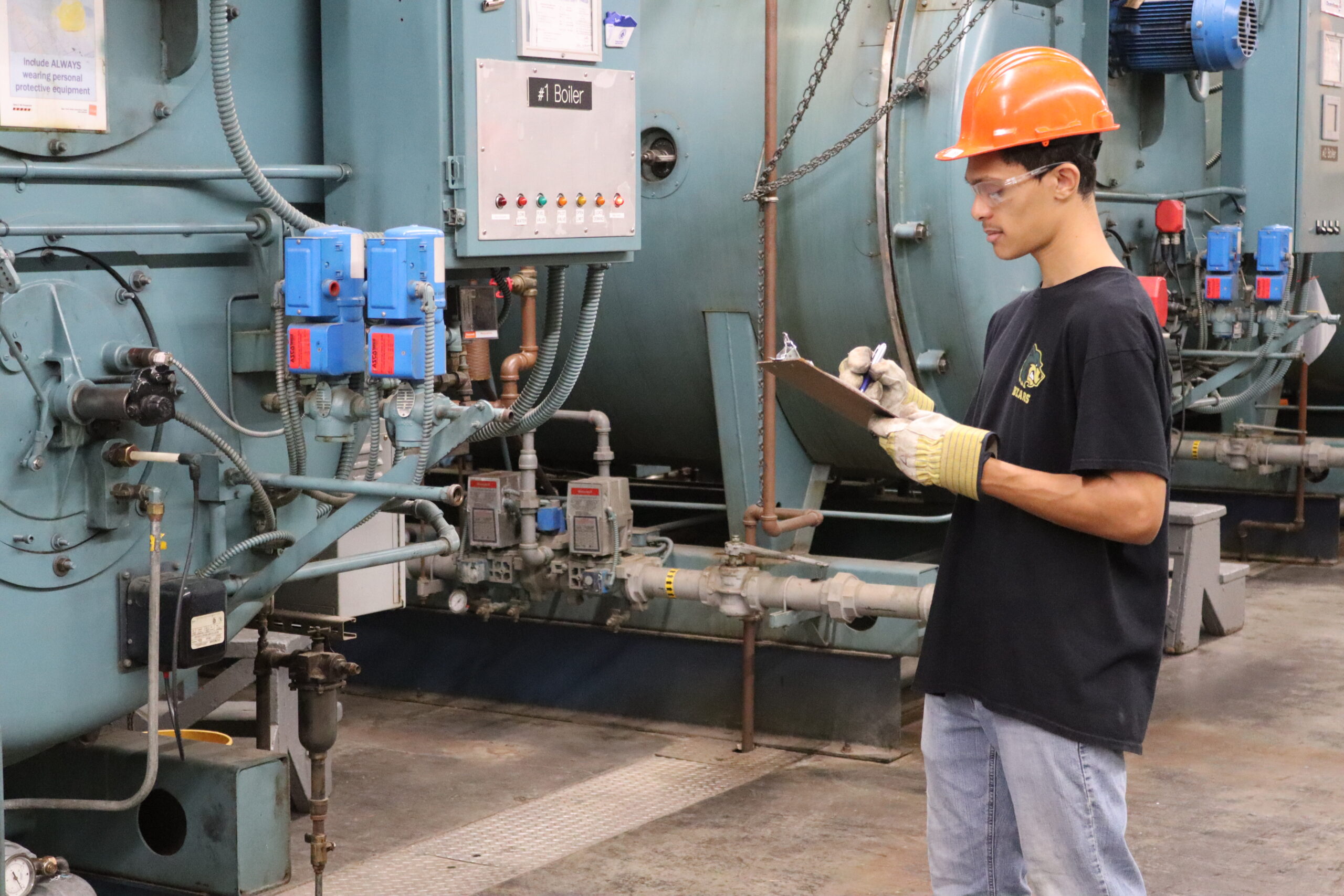
Junior Related 1
Steam Plant Operations
This course is designed to deepen students’ understanding of steam plant operation and prepare them for the Massachusetts 2nd Class Fireman’s License exam.
Key Topics:
- Boiler Operation and Maintenance:
- Starting up and shutting down boilers
- Monitoring boiler performance and efficiency
- Troubleshooting boiler malfunctions
- Performing routine maintenance tasks
- Boiler Water Chemistry:
- Water treatment processes (chemical and physical)
- Water quality parameters (pH, alkalinity, conductivity)
- Water testing and analysis
- Blowdown and feedwater control
- Turbine Systems:
- Steam turbine operation and maintenance
- Turbine components (blades, rotors, casings)
- Turbine efficiency and performance
- Turbine control systems
- Condenser Systems:
- Condenser types and operation
- Condenser performance and maintenance
- Cooling water systems
- Auxiliary Systems:
- Pumps, fans, and compressors
- Piping systems and valves
- Instrumentation and control systems
- Safety and Environmental Regulations:
- OSHA and EPA regulations
- Emergency procedures
- Lockout-tagout procedures
Hands-on Training:
- Simulator Training: Using simulation software to practice boiler operation and troubleshooting.
- Plant Visits: Observing real-world power plant operations.
- Maintenance Tasks: Performing maintenance tasks on power plant equipment.
- Troubleshooting Exercises: Identifying and resolving common plant problems.
By the end of this course, students will be well-prepared to take the Massachusetts 2nd Class Fireman’s License exam. They will have a deep understanding of boiler operations, safety procedures, and troubleshooting techniques. Additionally, they will be able to effectively communicate with plant operators and engineers, and work safely and efficiently in a power plant environment.
Junior Related 2
Engineering Math II/Schematics
This course expands on the foundational mathematical skills introduced in Engineering Math I, focusing on their application in engineering contexts.
Key Topics:
Algebra and Trigonometry:
- Linear Equations and Inequalities: Solving and graphing linear equations and inequalities.
- Quadratic Equations: Solving quadratic equations by factoring, completing the square, and using the quadratic formula.
- Trigonometry: Understanding trigonometric functions, solving triangles, and applying trigonometry to real-world problems.
Geometry:
- Geometric Shapes and Properties: Analyzing and calculating properties of geometric shapes (e.g., area, volume, surface area).
- Coordinate Geometry: Plotting points, finding distances, and determining slopes of lines.
Measurement and Units:
- SI Units: Understanding and using the International System of Units.
- Unit Conversions: Converting between different units of measurement.
- Precision and Accuracy: Evaluating the precision and accuracy of measurements.
Data Analysis and Statistics:
- Data Collection and Organization: Collecting, organizing, and displaying data.
- Statistical Measures: Calculating measures of central tendency (mean, median, mode) and dispersion (range, variance, standard deviation).
- Data Analysis: Analyzing data using statistical techniques and interpreting results.
Engineering Applications:
- Blueprint Reading: Interpreting technical drawings and blueprints.
- Mechanical Measurements: Using measuring instruments (e.g., calipers, micrometers) to take precise measurements.
- Electrical Calculations: Applying mathematical principles to electrical circuits.
- Fluid Mechanics Calculations: Solving problems related to fluid flow and pressure.
- Structural Analysis: Analyzing the forces and stresses on structures.
By the end of this course, students will be able to:
- Apply mathematical concepts to solve engineering problems.
- Interpret technical drawings and blueprints.
- Use mathematical tools to analyze data and make informed decisions.
- Communicate mathematical ideas effectively.
- Collaborate with others to solve engineering challenges.
This course provides a strong foundation in mathematics for engineering students, enabling them to succeed in more advanced engineering courses and real-world applications.
Senior Program
This senior-level course provides advanced training in steam plant operation and maintenance, preparing students to excel in the power industry.
Key Topics:
- Boiler Operation and Maintenance:
- Starting up and shutting down boilers
- Monitoring boiler performance and efficiency
- Troubleshooting boiler malfunctions
- Performing routine maintenance tasks
- Boiler Water Chemistry:
- Water treatment processes (chemical and physical)
- Water quality parameters (pH, alkalinity, conductivity)
- Water testing and analysis
- Blowdown and feedwater control
- Turbine Systems:
- Steam turbine operation and maintenance
- Turbine components (blades, rotors, casings)
- Turbine efficiency and performance
- Turbine control systems
- Condenser Systems:
- Condenser types and operation
- Condenser performance and maintenance
- Cooling water systems
- Auxiliary Systems:
- Pumps, fans, and compressors
- Piping systems and valves
- Instrumentation and control systems
- Safety and Environmental Regulations:
- OSHA and EPA regulations
- Emergency procedures
- Lockout-tagout procedures
Hands-on Training:
- Simulator Training: Using advanced simulation software to practice real-world scenarios.
- Plant Visits: Observing and learning from experienced operators in real-world power plants.
- Maintenance Tasks: Performing maintenance tasks on power plant equipment.
- Troubleshooting Scenarios: Identifying and resolving complex plant problems.
Preparing for the Massachusetts 2nd Class Fireman’s License:
This course is specifically designed to prepare students for the Massachusetts 2nd Class Fireman’s License exam. Students will gain a deep understanding of boiler operations, safety procedures, and regulatory compliance. They will also develop the practical skills needed to operate and maintain power plant equipment safely and efficiently.
By the end of this course, students will be well-prepared to enter the workforce as qualified stationary engineers. They will have the knowledge and skills to work in a variety of power plant settings, including utility plants, industrial facilities, and cogeneration plants.
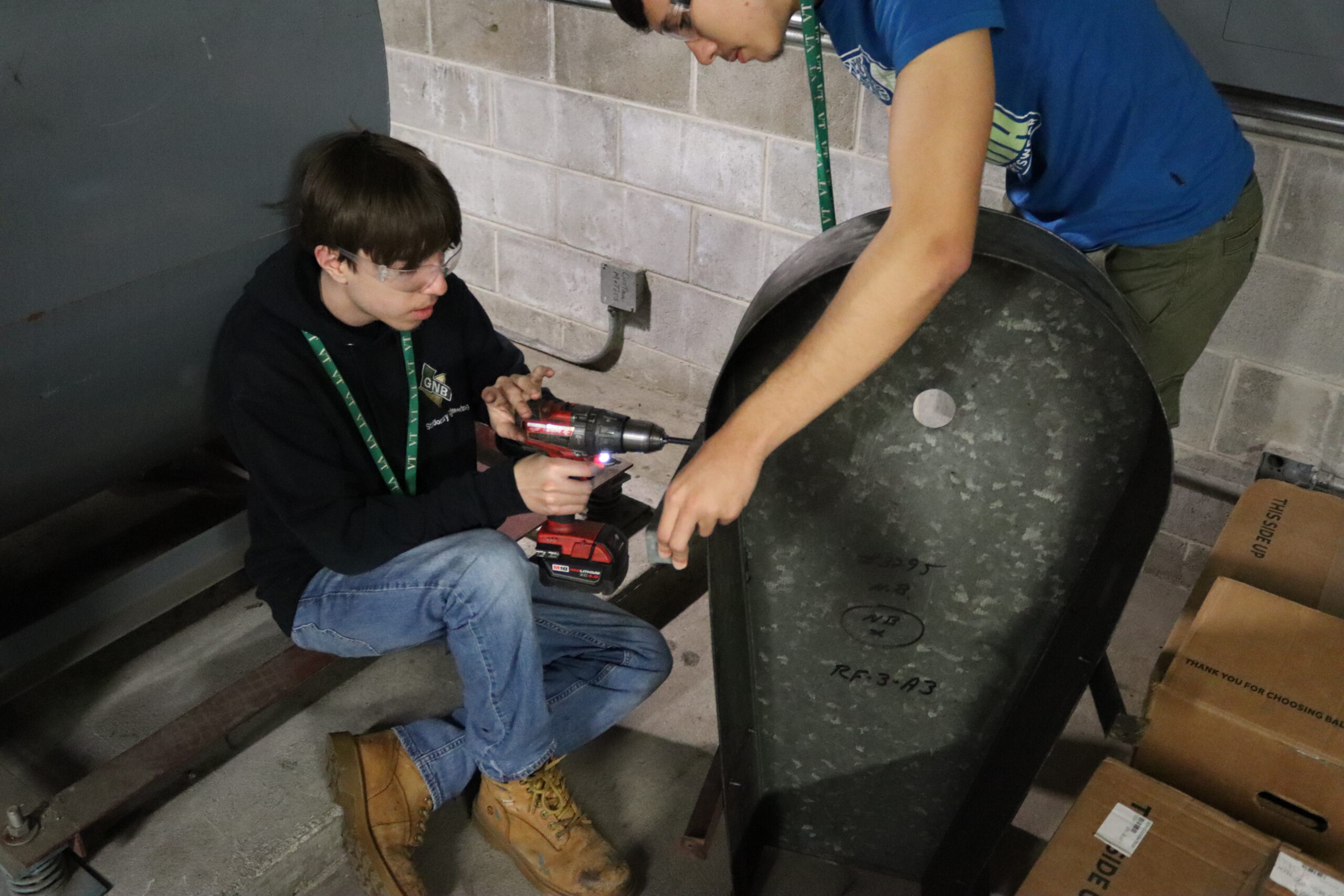
Senior Related 1
Preparation for Fireman’s Exam
This course is specifically designed to prepare students for the Massachusetts 2nd Class Fireman’s License exam. By reviewing and reinforcing key concepts, students will gain the knowledge and confidence needed to successfully pass the exam.
Key Areas of Focus:
- Boiler Operation and Maintenance:
- Starting up and shutting down boilers
- Monitoring boiler performance and efficiency
- Troubleshooting boiler malfunctions
- Performing routine maintenance tasks
- Boiler Water Chemistry:
- Water treatment processes (chemical and physical)
- Water quality parameters (pH, alkalinity, conductivity)
- Water testing and analysis
- Blowdown and feedwater control
- Turbine Systems:
- Steam turbine operation and maintenance
- Turbine components (blades, rotors, casings)
- Turbine efficiency and performance
- Turbine control systems
- Condenser Systems:
- Condenser types and operation
- Condenser performance and maintenance
- Cooling water systems
- Auxiliary Systems:
- Pumps, fans, and compressors
- Piping systems and valves
- Instrumentation and control systems
- Safety and Environmental Regulations:
- OSHA and EPA regulations
- Emergency procedures
- Lockout-tagout procedures
Exam Preparation Strategies:
- Review of Key Concepts: Reviewing fundamental principles and theories.
- Practice Exam Questions: Solving practice questions to assess knowledge and identify areas for improvement.
- Time Management: Developing effective time management skills to complete the exam within the allotted time.
- Test-Taking Strategies: Implementing effective test-taking strategies, such as reading questions carefully and managing time wisely.
- Stress Management: Learning relaxation techniques to manage exam anxiety.
By the end of this course, students will be well-prepared to take the Massachusetts 2nd Class Fireman’s License exam. They will have a strong understanding of boiler operation, safety procedures, and regulatory compliance, and be able to apply this knowledge to real-world situations.
Senior Related 2
Analytical Math/Schematics – Elective
This course is designed to provide students with the mathematical and technical skills necessary to analyze and understand the operation of power plant systems.
Key Topics:
Mathematical Concepts:
- Algebra:
- Linear equations and inequalities
- Quadratic equations
- Exponents and logarithms
- Trigonometry:
- Trigonometric functions and identities
- Solving triangles
- Applications in engineering problems
- Geometry:
- Geometric shapes and properties
- Pythagorean theorem
- Trigonometric ratios
- Calculus:
- Derivatives and integrals
- Applications of calculus to engineering problems
Technical Drawing and Schematics:
- Blueprint Reading: Interpreting technical drawings and blueprints.
- P&ID Diagrams: Understanding piping and instrumentation diagrams.
- Electrical Schematics: Reading and interpreting electrical schematics.
- Mechanical Drawings: Reading and interpreting mechanical drawings.
- CAD Software: Using CAD software (e.g., AutoCAD) to create and modify drawings.
Applications in Power Plant Operations:
- Performance Calculations: Calculating boiler efficiency, turbine output, and heat rate.
- Fluid Mechanics: Analyzing fluid flow in pipes and pumps.
- Heat Transfer: Calculating heat transfer rates and thermal efficiency.
- Control Systems: Understanding control loops and feedback systems.
- Data Analysis: Interpreting data from plant sensors and instruments.
By the end of this course, students will be able to:
- Apply mathematical concepts to solve engineering problems.
- Interpret technical drawings and schematics.
- Analyze and troubleshoot power plant systems.
- Use computer-aided design tools to create and modify designs.
- Make informed decisions based on data analysis.
This course provides a strong foundation in mathematical and technical skills, enabling students to excel in their roles as stationary engineers and power plant operators.
Certifications
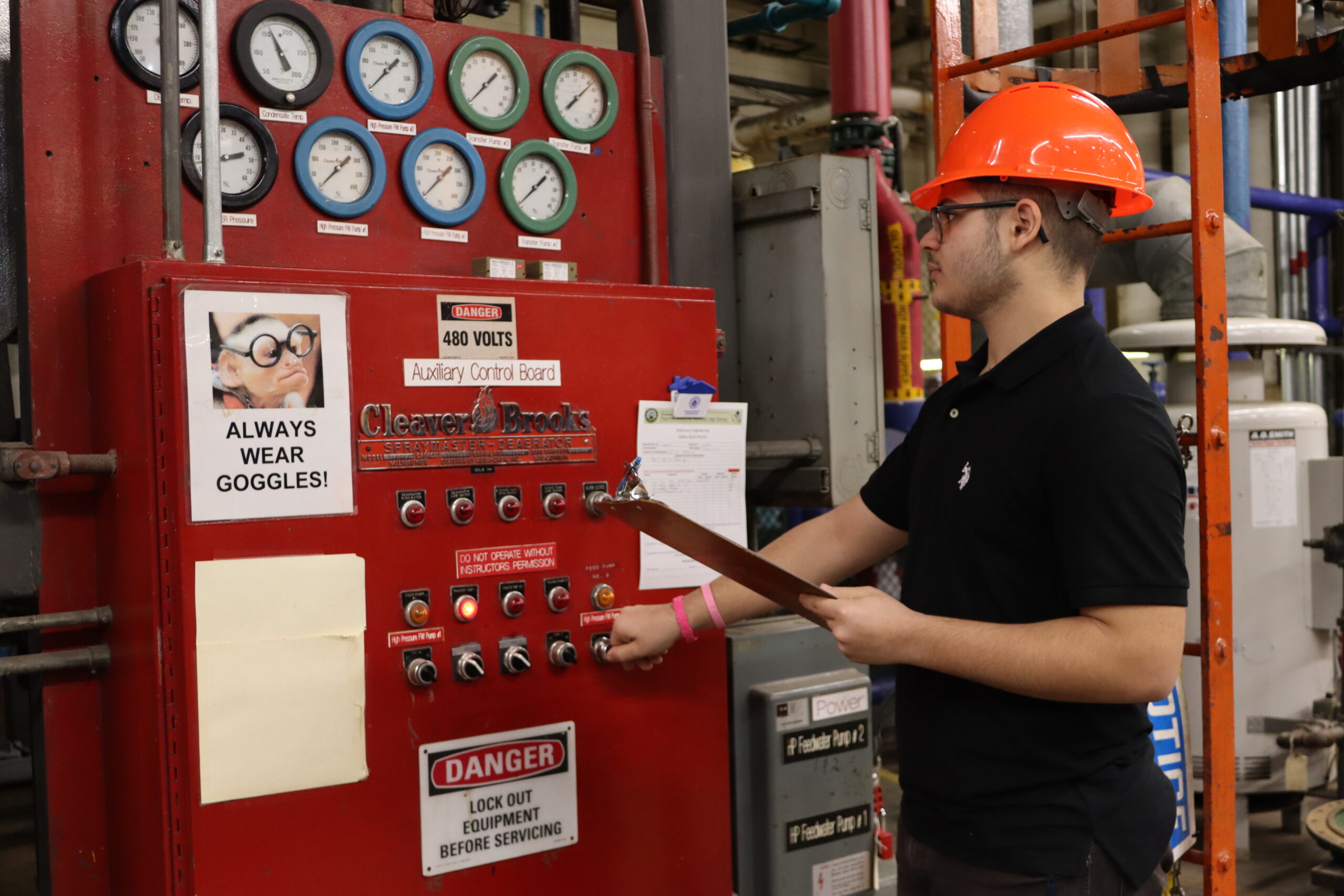
- OSHA 10 General Industry
- Massachusetts 2nd Class Fireman’s License
- Massachusetts 1st Class Fireman’s License
Career Opportunities
- Stationary Engineer
- Boiler Operator
- Power Plant Operator
- Facility Maintenance Technician
- Energy Manager
- Assistant Fireman
- Assistant Oil Burner Repairmen
- Machine Operator
- Pipe Fitter Assistant
- Sprinkler Technician Assistant
- 2nd Class Fireman
- 1st Class Fireman
- High-Pressure Boiler Operator
- Boiler Technician
- Boilermaker
- Oil Burner Technician
- Chief 3rd Class Plant Control Technician
- Waste Treatment Operator
- Maintenance Supervisor
- 2nd Class Engineer Chief
- 2nd Class Plant Control Room Operator
- Watch Engineer
- Mechanical Engineer
- Chemical Engineer
- Design Engineer
- 1st Class Engineer Chief
- 1st Class Plant Industrial Management Operational Coordinator
Post-Secondary Education
Further Education:
- Facilities Management
- Mechanical Engineering
- Industrial Engineering
- Marine Engineering
- Power Plant Technology
- Building Systems Engineering
